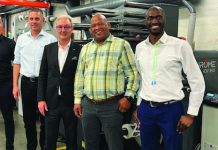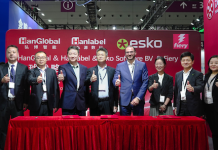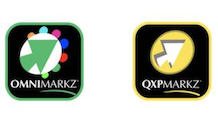Africa Print attended Tetra Pak’s presentation in Isando on 15 August where Stefan Fageräng, Managing Director of Tetra Pak Southern Africa, elaborated on the company’s sustainable packaging initiatives and how it is using the latest technology to reduce machine breakdowns and streamline the packaging process.
Technology
Augmented reality has been introduced to provide 24/7 back-up service anywhere in the world. The HoloLens is a handsfree headset with goggles. Tetra Pak is currently using the technology with a limited number of sets, and will begin to introduce the technology to its new and existing customers in the near future. Fageräng estimates that this technology will reduce machine breakdowns by 15%.
HoloLens enables parties on different sides of the world to not only communicate with each other, but provide backup service with a cursor and machine data in real time. That means one party in a factory can relay visual information from a machine breakdown to a backup technician/service engineer on the other side of the world, who in turn can provide guidance in real time with a solution. A problem that could take days can now be resolved in matter of hours, maybe less. Less breakdowns ensure lifecycles in fresh food are prolonged.
Sustainability
Tetra Pak Southern Africa has a clear vision and mission, spearheaded by the need for its operations to consume less water and electricity, while producing less waste. Additionally, the company’s tree planting initiatives ensure less CO2, while its packaging materials get produced through non-arable land, as well as with renewable resources, all while ensuring fresh containment.
Many packaging samples were presented at the event, which according to Fageräng are up to 87% renewable, with some of the materials used derived from bio-based materials such as sugar cane. The packaging also includes QR codes to scan that give consumers packaging information. Tetra Pak’s goal is to continue to take more non-renewable materials out of its packaging – one of the recycling initiatives which the company has heavily invested in. Tetra Pak has even gone as far as to recycle its cartons to create an outer packaging for its new cartons. The samples presented included packaging for custard, fruit juice and milk, as well as a packaging for pasta sauce – a suitable replacement for metal tins.
Tetra Pak is also working with retailers to turn old cartons into shopping bags, and is continuously devising other means to contribute to the circular economy, such as reducing the weight of recycled fibres, as weight equals a negative CO2 audit.
The company recently announced the introduction of paper straws in Europe, which are being field tested by customers. However, there have been challenges including the fact that several years are required to replace the billions of existing non-paper straws.
Replacing the bender of the straw, and developing special glues to prevent the straw from becoming soggy are additional challenges for which the company is working on a solution. Fageräng anticipates that the paper straws could possibly be seen in South Africa next year, as tests and assessments are conducted.
Fageräng concluded by emphasising on his on passion for sustainable packaging, which ensures a fresh and healthy product for the consuming public.
TETRA PAK SOUTH AFRICA +27 11 570 3000 https://www.tetrapak.com/za/





















